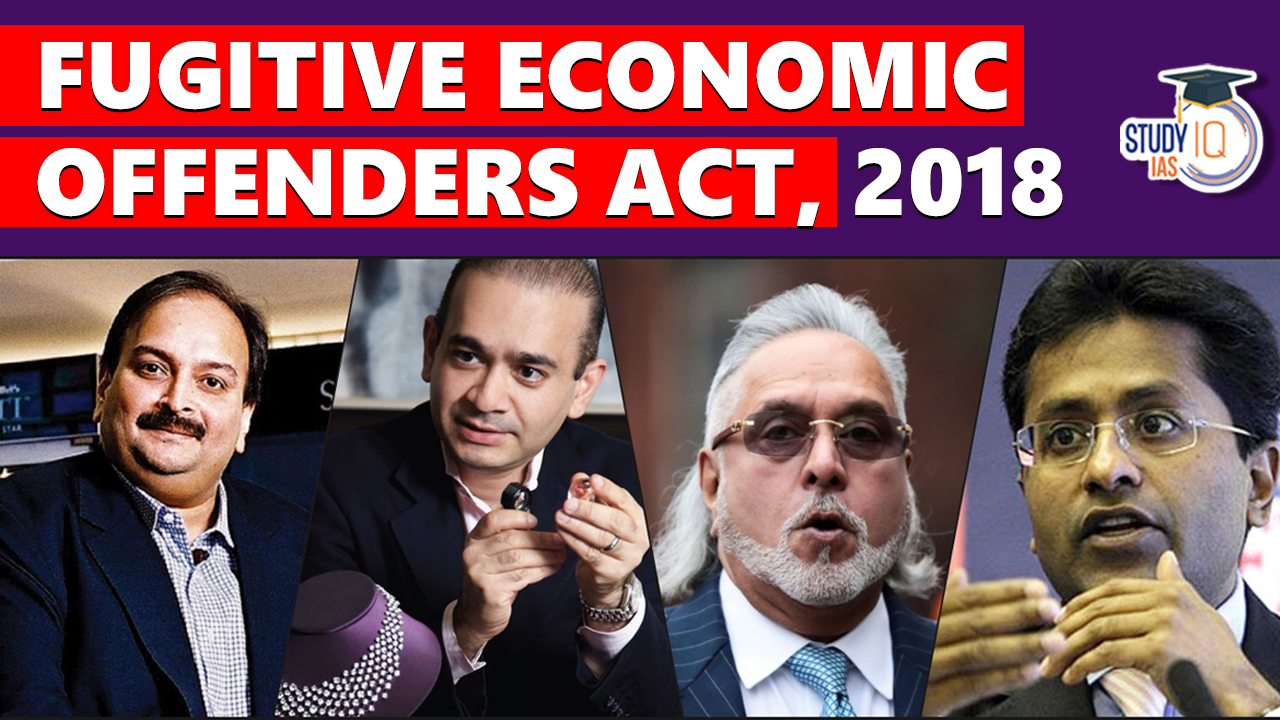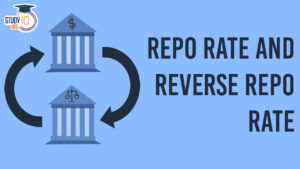Table of Contents
Industrial growth is important for a country’s development, requiring significant investments from banks and financial institutions. Recently, there has been a troubling trend where wealthy entrepreneurs involved in scams flee abroad to escape legal action. This results in rising non-performing assets (NPAs) and undermines public trust in the financial system. To address this issue, the Government of India introduced the Fugitive Economic Offenders Act, 2018. This law aims to deter those who evade legal processes and ensure they are held accountable under Indian law.
A “fugitive economic offender” is defined as someone for whom a special court has issued an arrest warrant for a serious offense and who has left India to avoid prosecution or refuses to return. The Act seeks to protect the rule of law and restore trust in the economy.
Fugitive Economic Offenders Act 2018
In today’s global financial system, fugitive economic offenders are a major concern for governments everywhere. To address economic crimes and prevent people from escaping legal consequences, India enacted the Fugitive Economic Offenders Act (FEOA) in 2018.This landmark legislation aims to provide a robust legal framework to swiftly apprehend and bring to justice those who have absconded from the country after committing economic offences. In this article, we will look into this legislation in detail.
Read about: Liberalized Exchange Rate Management System
Fugitive Economic Offenders Act Objectives
The Fugitive Economic Offenders Act 2018, was enacted in India to address the issue of economic offenders who flee the country to evade criminal prosecution or refuse to return and face justice. The act aims to confiscate their properties and assets acquired through illegal means.
Read about: Exchange Traded Funds
Declaration of Fugitive Economic Offender
Under the act, a person against whom an arrest warrant has been issued for committing an offence valued at least Rs. 100 crore can be declared a Fugitive Economic Offender (FEO). The special court designated under the Prevention of Money Laundering Act (PMLA) can declare an individual as an FEO and confiscate their properties, including proceeds of crime and benami properties, both in India and abroad.
Read about: Economic Liberalization in India
Bar on Filing or Defending Civil Claims
The act grants the power to civil courts and tribunals to prohibit a declared FEO from filing or defending any civil claim. Additionally, any company or limited liability partnership where the FEO holds a majority stake may also be barred from filing or defending civil claims.
Burden of Proof
The burden of proof lies with the person accused of money laundering under the act. They must demonstrate that alleged proceeds of crime are, in fact, lawful property.
Read about: LPG Reforms in India
Powers and Authorities Under Fugitive Economic Offenders Act
The authorities under the PMLA exercise powers granted by the Fugitive Economic Offenders Act, including those similar to a civil court. These powers include search and seizure of documents or proceeds of crime and provisional attachment of properties during pending applications before the Special Court.
Read about: Gross Value Added
Fugitive Economic Offenders Act and Prevention of Money Laundering Act
The Fugitive Economic Offenders Act operates in conjunction with the PMLA, which deals with offences related to money laundering. Money laundering involves concealing the identity of illegally obtained proceeds to make them appear legitimate. The PMLA provides punishment for money laundering, attachment of tainted property, and investigative responsibilities to the Enforcement Directorate (ED) and the Financial Intelligence Unit – India (FIU-IND). Here is a table that will help us understand this linkage better.
| Aspect | Fugitive Economic Offenders Act (2018) | Prevention of Money Laundering Act (PMLA) |
| Objective | Confiscate properties of economic offenders | Address money laundering and related offences |
| Scope | Deals specifically with economic offenders | Covers a broader range of money laundering crimes |
| Offences Covered | Offences listed in the FEOA | Money laundering offences under PMLA |
| Declaration of Fugitive Economic Offender | The special court can declare an individual as an FEO | No provision for declaring someone as an FEO |
| Confiscation of Properties | Confiscation of proceeds of crime and benami properties | Attachment and confiscation of tainted properties |
| Burden of Proof | The burden of proof lies with the accused | The burden of proof lies with the accused |
| Powers and Authorities | Powers similar to a civil court | Investigative powers granted to the ED |
| Linkage with PMLA | Operates in conjunction with the PMLA | The main legislation governing money laundering |
| Investigative Agency | Enforcement Directorate (ED) | Enforcement Directorate (ED) |
| Financial Intelligence Unit | FIU-IND | FIU-IND |
Read about: NRI Deposits
Fugitive Economic Offenders Act Significance and Impact
The following points comprehensively highlight the impact and significance of the Fugitive Economic Offenders Act, of 2018.
- Strong Legal Framework: The act strengthens the legal framework to tackle economic offenders evading prosecution.
- Property Confiscation: Authorities can confiscate proceeds of crime and benami properties, preventing offenders from enjoying illegal gains.
- Combatting Financial Frauds: It helps combat financial fraud and holds offenders accountable for their actions.
- Economic Recovery: Confiscated assets contribute to economic recovery, repayment of creditors, compensation for victims, and funding of welfare programs.
- Safeguarding National Interests: The act protects national interests by preventing offenders from fleeing and upholding financial system integrity.
- Deterrent Effect: Strict provisions and property confiscation act as deterrents against economic offences.
- International Cooperation: Facilitates international cooperation in arresting, extraditing, and repatriating fugitive offenders.
- Transparency and Accountability: Promote transparency, and accountability, and restores public trust in the system.
Read about: Gross Value Added
Fugitive Economic Offenders Act 2018 Concerns
Concerns associated with the Fugitive Economic Offenders Act (FEOA) are as follows:
- Access to Justice: Barring FEOs or associated companies from filing or defending civil claims may infringe upon the Right to Life under Article 21 of the Constitution, which includes the right to access justice.
- Treatment of Sale Proceeds: The Act does not clarify if the central government will share the sale proceeds of confiscated properties with other claimants, such as unsecured creditors, who do not have a direct interest in the properties.
- Absence of Safeguards: The FEOA allows authorities to conduct searches without a warrant and without the presence of a witness, potentially compromising safeguards against harassment and abuse of power.
- Confiscation Process: The process of property confiscation under the FEOA differs from other laws, such as the Criminal Procedure Code, as it allows for immediate confiscation upon declaration, without a specific timeline for finalizing the confiscation.
It is important to address these concerns to ensure a balanced approach in implementing the Fugitive Economic Offenders Act while upholding fundamental rights and ensuring fair treatment for all parties involved.
Read about: Concept of GDP, GNP, NNP and NDP
Issues in the act that require attention.
While the Fugitive Economic Offenders Act provides a 90-day timeframe for handling confiscated property after declaring someone a fugitive, it lacks clarity on the duration of court proceedings, leading to delays. The government must send requests to foreign countries to confiscate assets, but it hasn’t established agreements with all nations. The threshold of ₹100 crores could be exploited through multiple smaller offenses. Additionally, the act does not clearly state how the proceeds from confiscated assets should be used, creating potential loopholes for offenders.
Despite these issues, the Act serves as a deterrent for future economic offenders and holds past offenders accountable, protecting investors and improving the financial stability of institutions. It aims to bring individuals under Indian jurisdiction without directly penalizing them. This approach has been deemed constitutional, as highlighted by Piyush Goyal when he introduced the bill, emphasizing its effectiveness in preventing offenders from fleeing. The first person charged under this act is Vijay Mallya, a liquor baron, whose assets are being confiscated due to an alleged ₹90,000 crore default, marking the Act’s implementation.
Fugitive Economic Offenders Act 2018 UPSC
The Fugitive Economic Offenders Act, 2018, holds great significance for UPSC (Union Public Service Commission) aspirants as it pertains to the UPSC Syllabus in areas such as governance, ethics, and economy. Familiarity with this topic is crucial for candidates, and they can prepare it through UPSC Online Coaching and UPSC Mock Test, as it reflects the government’s efforts to combat economic offences and prevent offenders from evading prosecution. Understanding the provisions, objectives, and implications of the Fugitive Economic Offenders Act is essential for aspirants to gain a comprehensive understanding of governance, ethics, and the measures taken to safeguard the financial system.
Read about: Balance of Payments


 Nilgiri Biosphere Reserve, Map, Climate,...
Nilgiri Biosphere Reserve, Map, Climate,...
 Repo Rate and Reverse Repo Rate, Impact ...
Repo Rate and Reverse Repo Rate, Impact ...
 Foreign Contribution Regulation Act (FCR...
Foreign Contribution Regulation Act (FCR...





















